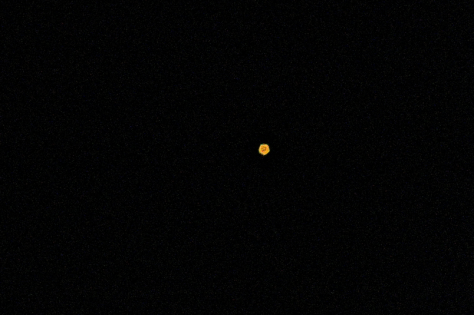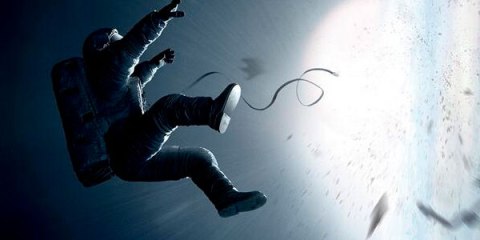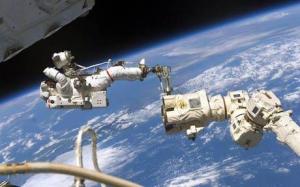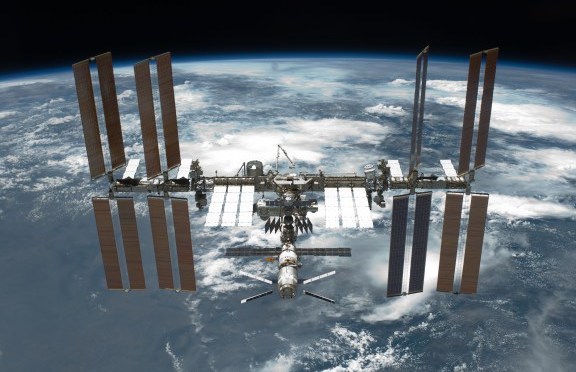
Here’s the thing about outer space: we’re not supposed to be there. Nothing about it is conducive to life as we know it. There’s no oxygen and very low air pressure. If we tried to enter outer space without the protection of pressurized suits, being in that vacuum would cause our lungs to rupture and oxygen to leave the bloodstream until we lost consciousness and died of hypoxia. Temperatures in space would either burn us up or freeze us. There is no protection from radiation. There’s also no gravity, without which we would eventually suffer from muscle atrophy and bone loss that would become apparent upon returning to any spinning chunk of rock that does have a gravitational pull. There’s also the vertigo to contend with.
Some people daydream about visiting outer space and seeing the curve of our planet from above its atmosphere, but I can’t. I’m way too scared of space. Forget paying thousands of dollars to buckle up on a commercial space flight someday; you couldn’t pay me enough to get me up there.
The terror that crops up imagining such an inhospitable place goes hand in hand with the beauty of space flight. Although humans are not meant to be outside the warm protection of Earth’s atmosphere, our curiosity, ingenuity, and seemingly endless reserves of pure determination have paid off and allowed us to do the unnatural. We have gone to space and lived to tell the tales. I can’t think of anything more inspiring.
From space, humans are able to peer down at their planet and view its frailty. It seems like a big place when your feet are firmly planted on the ground here, but Earth is actually very, very small even from a place as nearby as our moon. When Mars passed close to Earth a few years ago, I was able to snap a few shots of it with my camera’s digital zoom. The shots reveal a tiny orange speck in the sky, blurred quite a bit because I didn’t steady my camera on a tripod:

Imagine how Earth must look from Mars. And Mars is our neighbor.
There’s also an inherent loneliness in being so far from Earth. When you’re in outer space, even if you’re not as far as the moon, you’re able to see entire continents in one eyeful. That’s got to be humbling. It’s also got to be as alone as you’re ever going to be.
In Alfonso Cuaron’s latest film Gravity, Sandra Bullock’s character Ryan Stone comments on this when she says that her favorite thing about being in space is the silence. The movie opens with her on a spacewalk to perform some repairs, battling motion sickness and trying to concentrate on this, her first mission in space. Meanwhile, veteran astronaut Matt Kowalski (George Clooney) zips around enjoying his last mission in space, entertaining mission control with stories and trying to beat the world record for longest spacewalk.

But when mission control interrupts with instructions to immediately return to the spacecraft due to incoming debris, the routine spacewalk becomes life or death. They don’t make it back to the craft before the debris flies at them and tears the craft.

Stone ends up spinning out of control, detached from anything and without any way to steady herself or navigate her way to safety. Helpless and drifting free in space, she has trouble pinpointing her location as the Earth spins in and out of view. First-person camera view puts you right in her position, and it is not a comfortable experience. Her fear is also making her burn through her oxygen too fast.
Soon Kowalski manages to find her and attaches to her, using his jets to maneuver while yanking her along behind him. This is the start of their survival story.
I was already a big fan of Sandra Bullock, but Gravity has made me appreciate her more. She is fantastic in her delivery of a character who is smart, lonely, and absolutely  terrified of what’s happening to her. She has never been through this before, but over the course of the film, she journeys from a scared, sick scientist to a woman who has to think fast and will do absolutely anything to survive. She also goes from loving the silence of space to longing for the sound of human voices and dogs barking back on Earth.
terrified of what’s happening to her. She has never been through this before, but over the course of the film, she journeys from a scared, sick scientist to a woman who has to think fast and will do absolutely anything to survive. She also goes from loving the silence of space to longing for the sound of human voices and dogs barking back on Earth.
But for me, the best parts of the film are those that focus on the terror of being in outer space. Shots of the incoming debris field hurtling towards Stone made me jump. There were at least two instances of her having to grab onto handlebars on the exteriors of spacecrafts and then climb her way around the craft. These parts are hold-your-breath scary — especially when she has to let go of the handlebars to float herself toward a bar several feet or even yards away. If she misses that next rung, she’s done. That’s it. Once you’re drifting in space unattached to anything else, there’s no way back. Nobody’s sending up a search party for you, either.

Finding outer space to be as fascinating as it is petrifying, I spent several weeks in college watching documentaries about the Gemini and Apollo missions to the moon. Doing something so dangerous — almost unfathomably unrealistic — made those first astronauts famous. It was stupefying to think that when sewing the astronauts’ suits, missing one stitch would result in a person’s death, and forget about the idea of plummeting into the ocean in a cannonball that was on fire…
 I can’t think of anything scarier, which is exactly why Gravity was such a gripping movie for me. It has flaws — weak backstories for the characters and a few overdone lines, mostly — but what it sets out to do, it does well, and that’s make everyone watching absolutely grateful to be groundside. Outer space is inherently dramatic, and although we think of it as dark and empty, its lifelessness makes it the perfect place for stories about what make us alive.
I can’t think of anything scarier, which is exactly why Gravity was such a gripping movie for me. It has flaws — weak backstories for the characters and a few overdone lines, mostly — but what it sets out to do, it does well, and that’s make everyone watching absolutely grateful to be groundside. Outer space is inherently dramatic, and although we think of it as dark and empty, its lifelessness makes it the perfect place for stories about what make us alive.
— Ashley

